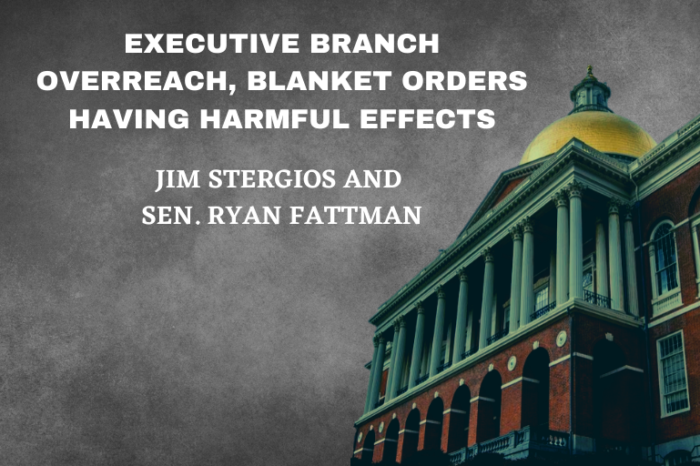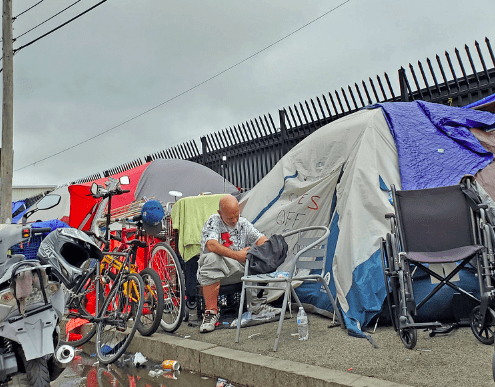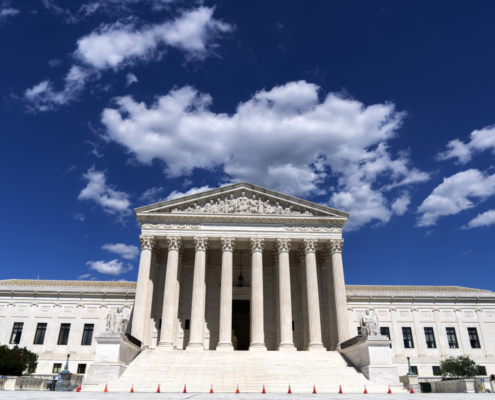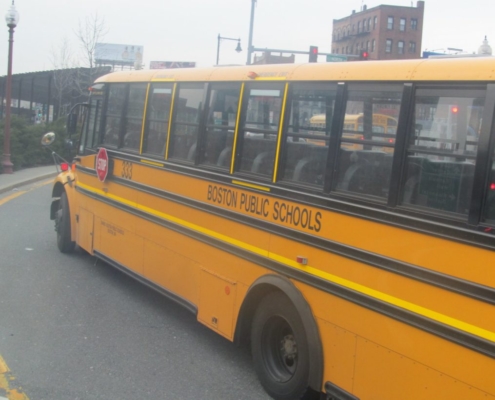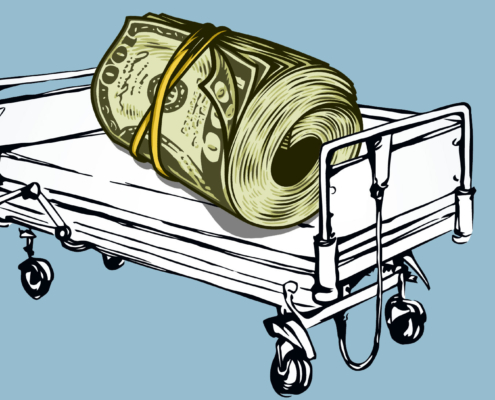Executive branch overreach, blanket orders having harmful effects
Written by James Stergios and Sen. Ryan Fattman (R-Sutton)
The was originally published in CommonWealth Magazine.
WHEN CONFRONTED WITH disasters, human beings need time to process how reality has changed and the best ways to move forward. To protect the public during the COVID-19 pandemic, elected officials have needed time to observe and analyze — and sometimes to take temporary emergency action, usually through the executive office.
At the outset of the pandemic, limited knowledge and the need to mitigate risk understandably led to political overreach. At this point in the disaster response, though, we are far better at distinguishing fact from fiction and policies that have worked from those that have not.
Massachusetts’s response has happily avoided the false and confusing messages frequently seen from the federal government. The Commonwealth’s hard work to bring its infection rate down is to be commended. That said, the state’s confusing and divisive “blanket” attempts at broad population control have come at a steep price.
Population control strategies require channeling significant time and labor into creating clear executive orders and bureaucratic enforcement mechanisms. In Massachusetts, they have diverted attention from a more effective strategy of actions targeted at our most at-risk population (nursing home residents) and two “high-reward” objectives — robust diagnostic testing and the re-opening of our K-12 schools.
In Massachusetts, more than 60 percent of the 8,700 COVID deaths have been in nursing homes — significantly higher than the national average. How did that happen? Nursing homes have been the subject of bureaucratic neglect for years, and with median operating margins declining to minus 4 percent, the industry was not prepared for a pandemic. In response to COVID-19, the administration prohibited people from visiting nursing homes; unfortunately, the virus was already raging inside the homes with devastating results. Homes needed financial resources, equipment, training, paid sick leave for staff, actions to isolate stricken residents — and they needed consistent testing.
Were we to face a second wave, the sad fact is that we are probably not prepared with the resources and testing needed to safeguard residents.
Effective public schools are critical to returning to some version of normality and reopening them requires a science-based plan. Unfortunately, the 2020-2021 academic year is slated to begin with cancellation of the first 10 days of school, teachers pitted against administrators, and confusion among parents and students.
How did we end up here? Last spring the state Department of Elementary and Secondary Education issued a cascade of confusing guidance documents.
Notwithstanding having significantly greater access to instructional, scientific, medical, and facility management expertise than do school districts, at the conclusion of a lost summer, DESE has yet to offer models for hybrid and remote learning. Instead, DESE adopted a lead-from-behind strategy through which it is requiring the Commonwealth’s more than 300 districts to develop individual plans.
Finally, there is diagnostic testing. We have known since March that ramping up testing is critical to public health, wellbeing and economic survival. In late May, Massachusetts was conducting 10,000 tests a day; by July, the number of daily tests conducted reached only a third of the governor’s goal of 45,000. With September around the corner, we now conduct 20,000 daily tests, most frequently with patients waiting five or more days for results. How is this possible, when two private Boston universities alone will be conducting 11,000 daily tests this fall with diagnostic results available within hours?
That’s the price we pay for a state government that is too occupied with population control. In fact, you might reasonably conclude that the most recent “blanket” order — the confusing travel restrictions from Rhode Island — were necessitated by the state’s inability to deliver a reasonable testing regime.
But there is another reason to oppose blanket policies: Effective disaster responses require unity of purpose, and unity is not something imposed from on high; it requires shared resolve and social reinforcement. Population-control strategies sow social divisions.
The disunity is real. Consider the small retail business that was not considered “essential,” yet had to watch as its big box competitor opened for business. Or the impact on local life when the governor suggests that neighbors report neighbors who might be disobeying emergency orders to the local or state authorities. Or “executive authorizations” that allow police to knock on the doors of private homes because there are several cars in a family’s driveway.
CommonWealth editor Bruce Mohl underscored the final reason to question the use of executive authority in a piece entitled “Baker’s Emergency Authority a Bit Fuzzy.” The governor’s emergency declarations to combat the spread of the virus rest, uneasily, upon a 1950 Session Law called the Massachusetts Civil Defense Act, which during the height of the Cold War granted governors extraordinary powers in the event of a nuclear attack.
Civil defense 70 years ago is a long way from public health amid a pandemic. Months into COVID, the Legislature needs to re-establish more accountable governing procedures. One such procedure would be to require legislative ratifications of all executive declarations within 10 days.
In March, we stepped into the new world of COVID-19 with understandable fear and apprehension. Back then, it was right to allow for temporary augmentations of government power. Now six months into the pandemic, blanket orders aimed at population control are leading to disunity, unaccountable government, and worse outcomes for Massachusetts residents. We need the Legislature to steer the governor back to a focus on the most critical responses to COVID-19.
Get Our COVID-19 News, Tips & Resources!
Related Content:

